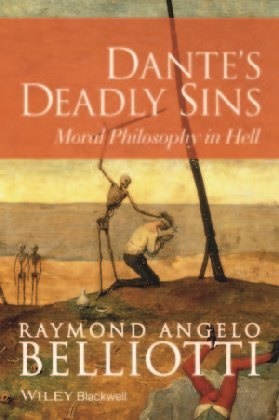Read more
Informationen zum Autor Raymond Angelo Belliotti is SUNY Distinguished Teaching Professor of Philosophy at the State University of New York at Fredonia. Belliotti's publications include Niccolò Machiavelli (2008), Roman Philosophy and the Good Life (2009), Posthumous Harm: Why the Dead are Still Vulnerable (2011), Shakespeare and Philosophy: Lust, Love, and Law (2012), and Jesus or Nietzsche: How Should we Live Our Lives ? (2013). Belliotti has received the SUNY Chancellor's Award for Excellence in Teaching, the William T. Hagan Young Scholar/Artist Award, the Kasling Lecture Award for Excellence in Research and Scholarship, and the SUNY Foundation Research & Scholarship Recognition Award. Klappentext Dante's Deadly Sins is a unique study of the moral philosophy behind Dante's master work that considers the Commedia as he intended, namely, as a practical guide to moral betterment. Focusing on Inferno and Purgatorio, Belliotti examines the puzzles and paradoxes of Dante's moral assumptions, his treatment of the 7 deadly sins, and how 10 of his most powerful moral lessons anticipate modern existentialism.* Analyzes the moral philosophy underpinning one of the greatest works of world culture* Summarizes the Inferno and Purgatorio, while underscoring their moral implications* Explains and evaluates Dante's understanding of the 'Seven Deadly Sins' and the ultimate role they play as the basis of human transgression.* Provides a detailed discussion of the philosophical concepts of moral desert and the law of contrapasso, using character case studies within Dante's work* Connects the poem's moral themes to our own contemporary condition Zusammenfassung Dante s Deadly Sins is a unique study of the moral philosophy behind Dante s master work that considers the Commedia as he intended, namely, as a practical guide to moral betterment. Inhaltsverzeichnis About the Author x Preface xii The Rationale xii The Origin xiii Acknowledgments xvii Introduction 1 The Historical Context 1 The Life of Dante 3 Later Writings 8 The Commedia 12 Dante's Death 14 Aims of this Book 15 Dante as Moral Philosopher 17 1 Inferno 19 Dante's Mission 19 The Journey Begins 20 Vestibule (Ante-Hell): The Indecisive Neutrals 21 Upper Hell: Sins of Unrestrained Desire (the Wolf) 23 River Styx, Walls of the City of Dis 28 Lower Hell: Sins of Malice Leading to Violence (the Lion) 30 Lower Hell: Sins of Malice Leading to Fraud (the Leopard) 34 Dante's Existential Lessons in Hell 46 2 Purgatorio 48 Purgatory in a Nutshell 48 The Journey Continues 50 Ante-Purgatory: Late Repentants 50 Gate of Purgatory 56 The First Three Terraces: Misdirected Love 57 The Fourth Terrace: Deficient Love of the Good 62 The Final Three Terraces: Excessive Love of Secondary Goods 64 Dante's Existential Lessons in Purgatory 71 3 The Notion of Desert and the Law of Contrapasso 73 The Notion of Desert 73 The Contrapasso 81 The Problem of Proportionality 87 First Case Study: Francesca90 Second Case Study:BrutusandCassius92 Third Case Study:Epicurus 99 Dante's Moral Conception 102 4 Paradoxes and Puzzles: Virgiland Cato104 The Paradox ofVirgil105 Summary of the Paradox ofVirgil111 The Strange Case ofCato 116 "The Perfect Stoic" 117 Dante's Decision 120 Danteand Conflict 123 5 The Seven Deadly Sins 124 Historical Background 124 Superbia (Pride) 127 Invidia (Envy) 129 Ira (Wrath) 133 Acedia (Sloth) 137 Avaritia (Avarice) 138

